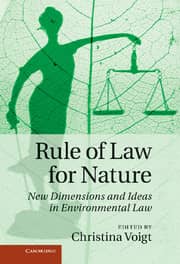Author
Christina Voigt (ed.)
Publication Year
November 2013
Source
Cambridge University Press
ISBN: 9781107337961
| BOOK DESCRIPTION |
‘Human laws must be reformulated to keep human activities in harmony with the unchanging and universal laws of nature.’ This 1987 statement by the World Commission on Environment and Development has never been more relevant and urgent than it is today. Despite the many legal responses to various environmental problems, more greenhouse gases than ever before are being released into the atmosphere, biological diversity is rapidly declining and fish stocks in the oceans are dwindling. This book challenges the doctrinal construction of environmental law and presents an innovative legal approach to ecological sustainability: a rule of law for nature which guides and transcends ordinary written laws and extends fundamental principles of respect, integrity and legal security to the non-human world.
| TABLE OF CONTENTS |
Contributors
Gwen Z. Abiola-Oloke, Julie A. Hambrook Berkman, Michael C. Blumm, Klaus Bosselmann, Rebecca M. Bratspies, Edith Brown Weiss, Hans Christian Bugge, Chizoba Chinweze, Larry B. Crowder, Cormac Cullinan, Duncan E. J. Currie, Surya Deva, Kristina M. Gjerde, Tore Henriksen, Chukwuemeka Jideani, Louis J. Kotz?, Jan Laitos, Ryke Longest, Massimiliano Montini, Annika K. Nilsson, Gail Osherenko, Froukje Maria Platjouw, Stephen E. Roady, Nicholas A. Robinson, Raphael D. Sagarin, Peter H. Sand, Linda Sheehan, Anastasia Telesetsky, Mary Turnipseed, Cristina Verones, Christina Voigt, Robin Warner, Gerd Winter, Mary C. Wood.
Preface
Part I – Environmental law at the crossroads: achievements, shortcomings and challenges
1 – Twelve fundamental challenges in environmental law (Hans Christian Bugge)
2 – Rule of law for nature in a kaleidoscopic world (Edith Brown Weiss)
3 – Evolved norms (Nicholas A. Robinson)
Part II – A rule of law for nature: theories and reflections
4 – Grounding the rule of law (Klaus Bosselmann)
5 – The rule of Nature’s law (Cormac Cullinan)
Part III – Designing a rule of law for nature: new dimensions and ideas
6 – Ecological proportionality (Gerd Winter
7 – Sustainable development and the rule of law for nature (Louis J. Kotz?)
8 – The principle of sustainable development (Christina Voigt)
9 – The need to recognize a coherent legal system as an important element of the ecosystem approach ( Froukje Maria Platjouw)
10- An emerging legal principle to restore large-scale ecoscapes (Cormac Cullinan)
11 – Traditional norms and environmental law (Chizoba Chinweze, Chukwuemeka Jideani, Gwen Z. Abiola-Oloke)
Part IV – Nature’s rights
12 – Rules of law for use and nonuse of nature (Jan Laitos)
13 – Realizing nature’s rule of law through rights of waterways (Linda Sheehan)
Part V – Procedural dimensions of a rule of law for nature
14 – Towards a new instrument for promoting sustainability beyond the EIA and the SEA (Massimiliano Montini)
15 – Enforcing environmental responsibilities (Annika K. Nilsson)
16 – Mechanisms for reviewing compliance with international environmental law open to private parties (Cristina Verones)
Part VI – Rule of law for nature and the role of companies and markets
17 – The green economy will not build the rule of law for nature (Rebecca M. Bratspies)
18 – Taking nature seriously (Surya Deva)
Part VII – A rule of law for the oceans
19 – Conservation of marine biodiversity and the International Maritime Organization (Tore Henriksen)
20 – Implementing the rule of law for nature in the global marine commons (Robin Warner)
21 – Using the public trust doctrine to achieve ocean stewardship (Mary Turnipseed, Michael C. Blumm, Duncan E. J. Currie, Kristina M. Gjerde, Peter H. Sand, Mary C. Wood, Julie A. Hambrook Berkman, Ryke Longest, Gail Osherenko, Stephen E. Roady, Raphael D. Sagarin, Larry B. Crowder)
About the author

Christina Voigt (ed.)
Christina Voigt is a Professor at the Department of Public and International Law, University of Oslo, Norway, where she work in particular on legal issues of climate change, sustainability and the interface between environmental and trade law.


